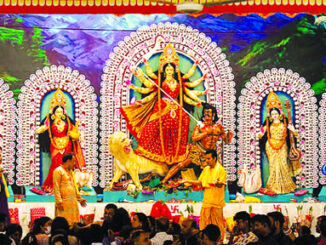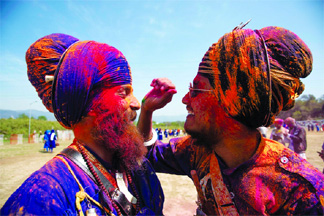
Dhanteras, which marks the beginning of Diwali, will be observed on October 29, Tuesday, this year. On this day, people worship Lord Dhanvantari, the God of Ayurveda, and Goddess Lakshmi, the Goddess of wealth and prosperity. ‘Dhan’ denotes wealth, and ‘Teras’ denotes the thirteenth day of Krishna Paksha. The day is considered to be an auspicious day for buying gold and silver jewellery, utensils, and even electronics in a bid to welcome Goddess Lakshmi and Lord Kubera—both representing wealth and prosperity in Hindu mythology—to their homes. It is also believed that making ‘big’ purchases on this day yields good luck in matters of wealth and prosperity.
Dhanteras is celebrated for several reasons, rooted in Hindu mythology and tradition:
Worship of Lord Dhanvantari
He is the god of health and Ayurveda, and is believed to have emerged from the ocean with a pot of amrita (elixir) during the churning of the milky ocean (Samudra Manthan).
Arrival of Goddess Lakshmi
Dhanteras marks the arrival of Goddess Lakshmi, the goddess of wealth and prosperity, who is believed to bring good fortune and prosperity.
Auspicious Beginnings
Dhanteras signals the beginning of Diwali celebrations, considered an auspicious time for new beginnings, investments, and purchasing valuable items.
Honoring Wealth and Prosperity
The festival honours Lord Kubera, the god of wealth, and Goddess Lakshmi, symbolizing the importance of wealth and prosperity.
Purification and Cleansing
Dhanteras is also associated with cleansing and purifying homes, minds, and souls, preparing for the illumination and joy of Diwali.
History and legend
Dhanteras, celebrated on Dhanatrayodashi, holds profound significance in Hindu mythology. It is said that during the Samudra Manthana, devas (gods) and asuras (demons) churned the ocean of milk in pursuit of the ‘amrit’ (nectar of immortality). Goddess Lakshmi, the embodiment of prosperity and wealth, and Lord Kubera, the god of wealth, arose from the turbulent sea, while Lord Dhanvantari, the god of health and Ayurveda, emerged with a pot of ‘amrit’, symbolising health and well-being. To honour them, devotees observe Dhanteras with reverence.
Another legend is that of the sixteen-year-old son of King Hima, whose horoscope predicted death by a snakebite on the fourth day of his marriage. Determined to save her husband, the clever bride devised a plan. She piled gold and silver coins at the entrance of their sleeping chamber and illuminated the area with lamps, creating a dazzling display.
As night fell, she sang enchanting songs and narrated stories to keep her husband awake and Yama, the god of death, at bay. When Yama arrived disguised as a serpent, the brilliance of the lamps and jewellery blinded him, preventing him from entering the chamber.
Instead, Yama climbed onto the coin heaps and listened to the bride’s mesmerising tales and melodies. Entranced, he remained there until dawn, sparing the prince’s life. As the sun rose, Yama silently departed.
Dhanteras is celebrated with a series of rituals aimed at welcoming prosperity and good health. The celebrations begin with cleaning homes and decorating entryways with rangolis and flowers to invite positive energy. Families often place traditional oil lamps (diyas) outside their homes to ward off negativity and darkness.
Buying precious metals, especially gold and silver, is considered highly auspicious on Dhanteras. Many people also purchase new kitchen utensils, symbolizing abundance, or invest in larger items like property or vehicles. This tradition is believed to bring good luck and prosperity for the coming year.
Puja Rituals
Puja (worship) on Dhanteras is performed during the shubh muhurat (auspicious time), which this year is from 7:00 PM to 8:49 PM, according to Drik Panchang. During this time, devotees perform rituals to seek blessings for wealth, health, and happiness.
Preparation
A small altar is set up with idols or pictures of Goddess Lakshmi, Lord Dhanvantari, and Lord Kuber. The space is decorated with flowers, diyas, and incense sticks.
Offering of Prayers
Devotees offer sweets, flowers, and symbolic items of wealth, such as coins or gold ornaments, to the deities. Special mantras are chanted to invoke blessings for prosperity and health.
Lighting Yama Deepam
Another important ritual is the lighting of Yama Deepam, an oil lamp placed outside the home to honor Lord Yama, the god of death, seeking protection for family members from negative influences.
Dhanteras is deeply symbolic, as it represents the blessings of wealth, health, and positivity for the coming year. The festival serves as a reminder of the importance of health and prosperity in life, with Lord Dhanvantari representing physical well-being and Goddess Lakshmi symbolizing material abundance.
The day’s rituals also emphasize purification, both of the home and of one’s inner self, setting a positive tone for Diwali. Lighting lamps and decorating homes with rangolis reflect the victory of light over darkness, symbolizing hope and prosperity.
This year, as families gather on Dhanteras, the festival will once again fill homes with the joy and blessings of good health, prosperity, and happiness, marking the beginning of a festive season that celebrates togetherness, light, and fortune.





Be the first to comment